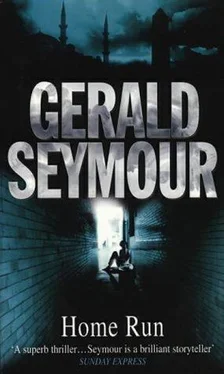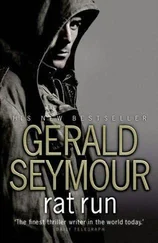Gerald Seymour - Home Run
Здесь есть возможность читать онлайн «Gerald Seymour - Home Run» весь текст электронной книги совершенно бесплатно (целиком полную версию без сокращений). В некоторых случаях можно слушать аудио, скачать через торрент в формате fb2 и присутствует краткое содержание. Жанр: Триллер, на английском языке. Описание произведения, (предисловие) а так же отзывы посетителей доступны на портале библиотеки ЛибКат.
- Название:Home Run
- Автор:
- Жанр:
- Год:неизвестен
- ISBN:нет данных
- Рейтинг книги:5 / 5. Голосов: 1
-
Избранное:Добавить в избранное
- Отзывы:
-
Ваша оценка:
- 100
- 1
- 2
- 3
- 4
- 5
Home Run: краткое содержание, описание и аннотация
Предлагаем к чтению аннотацию, описание, краткое содержание или предисловие (зависит от того, что написал сам автор книги «Home Run»). Если вы не нашли необходимую информацию о книге — напишите в комментариях, мы постараемся отыскать её.
Home Run — читать онлайн бесплатно полную книгу (весь текст) целиком
Ниже представлен текст книги, разбитый по страницам. Система сохранения места последней прочитанной страницы, позволяет с удобством читать онлайн бесплатно книгу «Home Run», без необходимости каждый раз заново искать на чём Вы остановились. Поставьте закладку, и сможете в любой момент перейти на страницу, на которой закончили чтение.
Интервал:
Закладка:
He did not know whether there was a curfew in Tabriz, and if there was a curfew then at what time it started. He didn't know where in the city he had been held. He only thought he was in Tabriz.
He ran until the stitch cut into his belly lining. When he aaw a cafe, benches outside, chairs and plastic topped tables inside, he had slowed and crossed to the far side of the road.
Where there was a shadow he tried to find it, and he had to skin his eyes to peer ahead of him, hard because his head was shaking from the exertion of running, because it would be fatal to be running and not looking and to barge into a patrol of the Revolutionary Guards.
He ran for a full five minutes. He was 52 years old, and he thought that he had run a mile. He had run on back streets, and he had heard laughter and shouting from inside small homes, and he had heard the voice of a radio announcer inciting verses from the Qur'an.
When he rested, when his legs and his wind had died, he crouched in a concrete storm drain.
Grab any luck that begs to be taken, the Major had said at the Fort. Luck is earned. Luck doesn't show itself that often, and if it's not grabbed then it's gone. He thought of Harriet, and he thought of his girls. The first time this day that he thought of his women tribe at home. They would have expected it of him, and it's for you, my darlings, that I run. No other beacon for Mattie.
A car pulled up in the street, ten paces from him. The driver took a parcel from the back seat of the car and carried it into a house. The engine was left running.
The driver made a gift of a car to Mattie.
Out of the storm drain, into the car. At first very gently away, hardly changing the beat of the motor. And once round the first corner, then he really went at it. He had not driven so fast since the year before he was married, since he had owned the Austin Healey Sprite. No sports car, this, but the bloody thing went, and he drove like there was no tomorrow, and probably there wasn't. He drove away out of the town, until he was surrounded by darkness, and then he stopped and axed the lights. He found a map in the glove compartment.
He was, by his best calculation, between 150 and 200 miles from the Turkish frontier, and by the grace of God, the stars were clear and bright and he was on the north-west edge of the town that he thought must be Tabriz.
The three guards who had been in the house placed the blame in entirety on those two men who had taken no precautions to defend themselves… The investigator would have done the same in their position, in his position he would do the same.
The investigator was told that there had been a period of fifteen minutes between the time that the food had been carried upstairs, and the discovery of two comrades, dead in the prisoner's cell.
Furniss had a start. More important was the fear of the guards who had survived. While they had searched the villa a full hour had passed, and only then had they summoned an ambulance. The police had not yet been informed, neither had the army, neither had the headquarters of the Islamic Revolutionary Guards. They had waited for the investigator to return.
It crossed his mind that he could do worse himself than make tracks for the Turkish frontier. But there was too much blood on his hands for him to be welcomed into asylum by the western agencies.
It was like a wound to him, the escape of Matthew Furniss.
He had the names of three agents, and the name of an infiltrator, nothing more. He had no detail yet on the running of Century's Iran Desk, on the collaboration between Century and Langley, on the gathering of intelligence from the British listening posts on the frontiers and the American satellites.
He should have had hard information on the passing of information from the Americans and the British to Baghdad, and on the battle engagement instructions to Royal Navy warships on the Armilla patrol. He had taken so little, and he had promised so much to the Mullah, and the Mullah would, no doubt, have repeated these promises to his own patrons. Well, he would start again when Furniss was recaptured, as he must be. No one would shelter an English spy in Tabriz. Deep in his gut was the tremor of insecurity, the ripple of the sensation of his own vulnerability.
When he had pieced together the story, he had himself driven to the IRG headquarters in the centre of the city. He gave the commander photographs of Matthew Furniss. He described what he knew him to be wearing when he escaped from the gaol, warned him that Furniss was armed with a pistol.
He wrote out the messages to be sent by radio.
He sent a terse report to the Mullah in Tehran.
He sent a description of Matthew Furniss to the Army Command of the north-west region.
There was no choice but to broadcast his failure over the airwaves.
Mattie had driven out on the Marand road. He had the map, and he reckoned the petrol tank had a minimum of a hundred miles, perhaps more. He would draw attention to himself if he speeded, and if he dawdled then he faced the greater risk of being trapped inside the gun net when the alarm was raised.
He took the wide bridge across the Meydan Chay. He rattled past factories that had been idle for years now that the war had soaked the resources of the nation; huge unlit ghost buildings. Just after the road crossed the old railway track that had once carried passengers and exports into the Soviet Union, he swung left off the main road. Any time on the main road had been risk, and he was sure that at Marand, the high oasis town, and at Khvoy, that was a centre of agricultural production, there would be road blocks. The road blocks would not necessarily be for him, but he could not afford to be stopped when he had no papers for the car, and no papers for himself.
The road that he chose was metalled for a dozen miles, then petered out into dirt and stone. The car took a hammering but he would not have need of it for long.
When he was high above the northern shore of Lake Urmia, when he could see the lights of the villages where before the Revolution a good wine had been produced, he saw the road block ahead.
Mattie recognized the block because on the road in front there was a line of tail lights, red, queueing, and he could see a torch being waved. There was a queue. It must be half a mile ahead of him. He was slowing, going down through his gears. He killed his lights… he pulled up to a halt. He had used his luck to make good ground away from Tabriz… N o choice now. It was time to walk. No way of knowing whether this was a block in position to halt him, or just there for routine. He swung the wheel hard to turn in the road.
He hadn't reckoned they would have read the manuals. He hadn't rated that there would be a guard stumbling up from the tree thicket at the side of the road, probably been dozing, probably awakened by the scrape of the tyres on the gravel hard shoulder of the tarmac road. He switched his headlights back on and saw the guard lumbering into the centre of the road. The lights blinded the guard. The guard was old, and under his forage cap there were locks of silvered hair and his beard was down to his throat, he seemed to wave at Mattie while the car was twenty yards from him, only realized at the last moment, in time to raise his rifle, aim the barrel into the heart of the light. Mattie drove straight at the guard.
He felt the shudder blow of the impact. He felt the heave of the bouncing wheels. For what felt many seconds Mattie's heart stopped. He drove, every second expecting a machine gun to sweep his life away. No, that was absurd. Not on this back road. And the odds were that the old man was alone.
Should have stayed where he was, fired first, no questions.
Perhaps the old man had children or grandchildren who had run from the guards. Past the next corner he saw a track into the trees. He turned on to it and followed it far enough to be hidden from the road and pulled the wheel hard to the left and sank the car into scrub. Out, Mattie, out. He was drained.
Читать дальшеИнтервал:
Закладка:
Похожие книги на «Home Run»
Представляем Вашему вниманию похожие книги на «Home Run» списком для выбора. Мы отобрали схожую по названию и смыслу литературу в надежде предоставить читателям больше вариантов отыскать новые, интересные, ещё непрочитанные произведения.
Обсуждение, отзывы о книге «Home Run» и просто собственные мнения читателей. Оставьте ваши комментарии, напишите, что Вы думаете о произведении, его смысле или главных героях. Укажите что конкретно понравилось, а что нет, и почему Вы так считаете.












